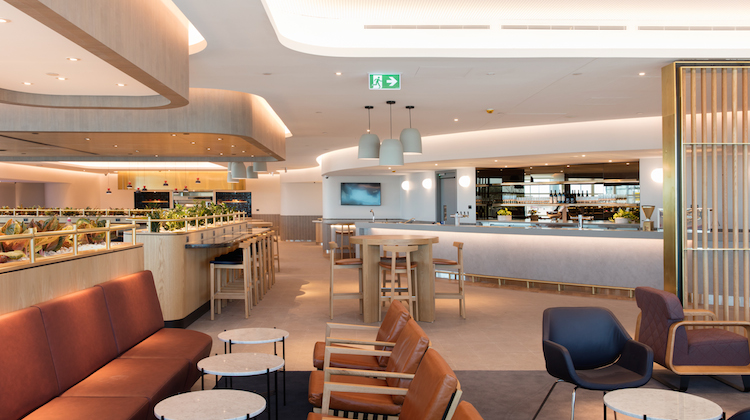
The number of international flights being booked for business purposes increased over 400 per cent in just six weeks, despite long-held concerns that corporate travel could fail to rebound after the COVID-19 pandemic.
New data released by Flight Centre has shown that between 7 February – the date the federal government announced the total reopening of Australia’s borders – and 23 March, the number of international flights booked by businesses for corporate purposes jumped 416 per cent.
Meanwhile, domestic bookings, which were already trending upwards in early February, increased by 18 per cent during the same period.
This is despite the long-held belief within the global aviation industry that business travel may never recover to its pre-COVID capacity, after two years of border closures, and the rise of online video conferencing.
Tom Walley, global managing director of Flight Centre’s SME service Corporate Traveller, said: “Travel bookings are an indicator of business confidence and optimism – particularly advance bookings.
“This is a significant uptick in bookings in just a six-week period, and we anticipate demand will climb steadily throughout the year as we continue to track bookings.
“Hundreds of our customers who paused their travel during the pandemic are kickstarting their programs again, while essential industries that continued travelling, such as medical, mining and engineering, are planning to invest more in their travel this year.”
Walley said that while 59 per cent of both its domestic and international corporate flight bookings were made up to 10 days before travel, 11 per cent were made at least four weeks ahead of the flight, with more businesses feeling increasingly confident to plan ahead.
Corporate Traveller data showed that a similar uptick was seen when domestic borders reopened with a 98 per cent increase in flights to NSW between 4 November and 7 February, and a 137 per cent increase in flights to Victoria during that same period.
“The travel industry experienced a slow start to the year due to the surge in Omicron cases. However, the combination of open borders, eased restrictions and a return to workplaces has given businesses and consumers a much-needed boost in confidence to travel,” Walley said.
“The recovery of the industry is in sight this year, as evidenced by the green shoots we’ve already seen in our flight bookings.”
Since 2020, the industry has been preparing for a permanent reduction in business travel as the world embraced new ways of conducting business amid COVID restrictions.
In late 2020, Forbes revealed that up to 36 per cent of pre-pandemic business travel capacity could be lost forever, while later, in 2021 Lindsey Roeschke, managing director for travel and hospitality analysis at Morning Consult predicted a more optimistic 15 per cent drop compared to pre-pandemic levels.
“Even if I’m wrong, and we do see a return to those levels, that’s still a massive loss for the industry as a whole,” she said, noting the significance of business travellers to the bottom line for both airlines and local hotels and hospitality venues.
However, airlines executives have remained confident that their offerings for corporate customers will be enough to win back their lucrative buying power.
“Business travel is not transactional, it’s about relationships,” said United Airlines CEO Scott Kirby in 2021.
“The first time someone loses a sale to a competitor who showed up in person is the last time we’ll do a sales call on Zoom.
“People were having this conversation 25 years ago with video conferencing and the death of business travel, it was wrong then, it’s wrong now.”
Closer to home, both Qantas and Virgin Australia have recently revamped their corporate travel offerings to entice business travellers back into the air.
Just last week, Virgin unveiled its newest Business Flyer program, which offers a competitive alternative to Qantas, again upping the ante in the post-pandemic domestic aviation battle.
With no minimum spend to sign-on and start earning points, it marks a significant deviation from Virgin’s previous “Business Accelerate” program, and places it more on-par with Qantas’ recently-overhauled Business Rewards program.
Offering up to 6 per cent off business class seats for Business Flyer program participants, it matches Qantas’ entry-level Business Rewards service, and comes right off the back of Virgin lowering its cheapest business class fares to just $299 one-way.
While, unlike Qantas, it doesn’t offer steeper discounts to its most frequent of flyers, Virgin does have its rival beat by not requiring any sign-on or ongoing membership fees, and annual lounge memberships for just $379 – as opposed to Qantas’ $89 sign-on fee and $400 annual lounge membership plus $99 lounge sign-up fee.
Qantas currently offers business customers a vast number of ways to earn Business Reward points, through on-ground partners such as credit card providers, while Virgin Business Flyers can only earn points through flying.
However, Virgin CEO Jayne Hrdlicka said that this fact could change in the near future.
















Matt
says:This article is littered with errors – Qantas Business Rewards has no fees whatsoever… but the article says it does. Huh? Needs a fact check.